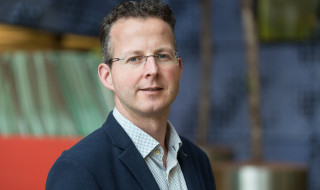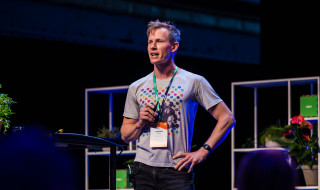Keynote and featured speaker
Listen to Cees Snoek’s keynote on what multimodal foundation models cannot perceive during the Advanced Computing User Day 2024.

Keynote Cees Snoek
Multimodal foundation models are a revolutionary class of AI models that provide impressive abilities to generate multimedia content and do so by interactive prompts in a seemingly creative manner. These foundation models are often self-supervised transformer-based models pre-trained on large volumes of data, typically collected from the web. They already form the basis of all state-of-the-art systems in computer vision and natural language processing across a wide range of tasks and have shown impressive transfer learning abilities. Despite their immense potential, these foundation models face challenges in fundamental perception tasks such as spatial grounding and temporal reasoning, have difficulty to operate on low-resource scenarios, and neglect human-alignment for ethical, legal, and societal acceptance.
In this talk, I will highlight recent work from my lab that identifies several of these challenges. I will also present ways to update foundation models to address these challenges. This can be done in a sustainable way, without the need to retrain from scratch.
About Cees Snoek
Cees G.M. Snoek is a full professor in computer science at the University of Amsterdam, where he leads the Video & Image Sense Lab. Additionally, he serves as the director of three public-private AI research labs: the QUVA Lab in collaboration with Qualcomm, the Atlas Lab with TomTom, and the AIM Lab with Core42. At University spin-off Kepler Vision Technologies he acts as Chief Scientific Officer. Professor Snoek also directs the ELLIS Amsterdam Unit and is the scientific director of Amsterdam AI, a collaboration between government, academic, medical and other organisations in Amsterdam to study, develop and deploy responsible AI.
He received his M.Sc. degree in business information systems (2000) and the Ph.D. degree in computer science (2005) both from the University of Amsterdam, The Netherlands. Previously, he held roles as an assistant and associate professor at the University of Amsterdam, as well as Visiting Scientist at Carnegie Mellon University in the U.S., and Fulbright Junior Scholar at UC Berkeley. He also headed R&D at University spin-off Euvision Technologies and worked as Managing Principal Engineer at Qualcomm Research Europe.
Professor Snoek's research centers on understanding video and image content. He has published over 250 peer-reviewed book chapters, journal and conference papers, and frequently serves as an area chair of leading conferences in computer vision, machine learning, and multimedia. He is currently an associate editor for the IEEE Transactions on Pattern Analysis and Machine Intelligence.
More information
Featured speaker

Thomas Wolf is the co-founder and Chief Science Officer (CSO) of Hugging Face, where he has been a pivotal figure in driving the company’s open-source, educational, and research initiatives. A prominent advocate for open science, Thomas has played a crucial role in making cutting-edge AI research and technologies widely accessible. He spearheaded the development of the Hugging Face Transformers and Datasets libraries, which have become foundational tools for researchers and developers in the machine learning community.
His contributions go beyond software development; Thomas is deeply invested in bridging the gap between academic research and industrial applications through projects like the BigScience Workshop on Large Language Models (LLM), which led to the creation of BLOOM, a large-scale open-source LLM.
With a diverse academic background spanning Physics, AI, and Intellectual Property, Thomas brings a unique interdisciplinary perspective to the field of advanced computing. He holds a Ph.D. in Statistical/Quantum Physics from Sorbonne University and has worked across both research and legal domains. Today, his research interests revolve around LLM accessibility and overcoming current limitations in AI. Outside of research, Thomas enjoys creating educational content, authoring the book Natural Language Processing with Transformers and sharing insights on the future of AI through blogs and videos.
More information
The programme
Besides the keynote from Cees Snoek and an interview with Thomas Wolf, the event will feature break out sessions on HPC, AI, Machine Learning, Quantum and Data Process and Management in research and business. Attendees will have the chance to learn from case studies, participate in collaborative discussions, and explore new developments.
Curious?
View the full programme